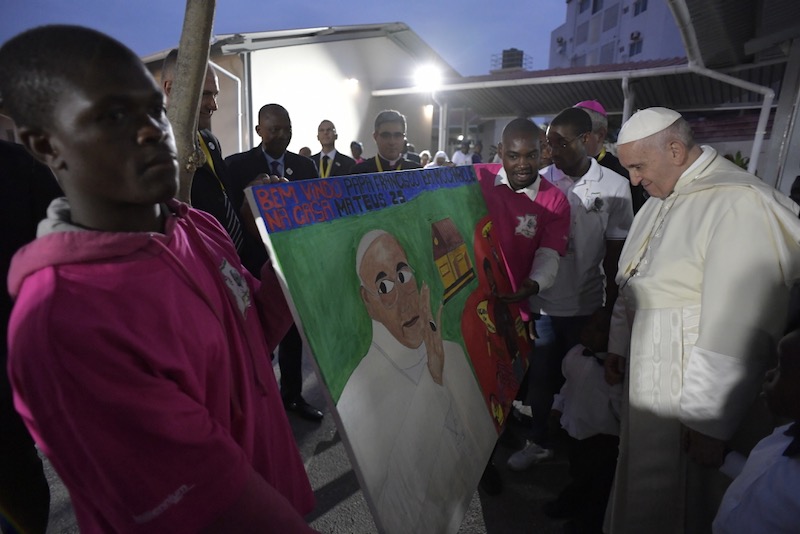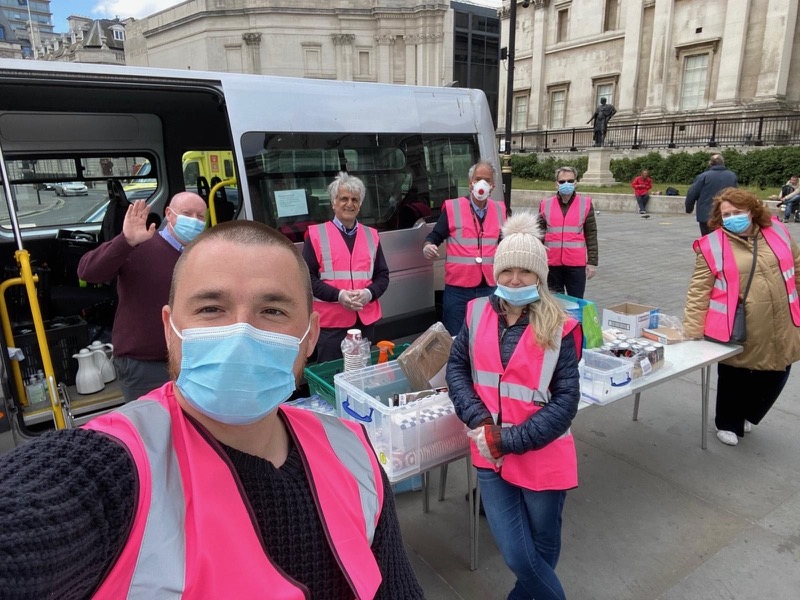Catholic churches and volunteers are growing increasingly concerned for homeless people as the pandemic continues.
Colette Joyce, Justice and Peace Coordinator for Westminster Diocese, said: "Westminster Council Rough Sleeping Team have been working miracles to get rough sleepers housed and supported in hotels but they have had to turn to the faith groups to provide the majority of the assistance to those still on the streets.”
More than 100 people daily are making their way to Trafalgar Square for something to eat and drink and “it is a stark reminder that we need to address the huge inequalities in our own society”.
Fr Dominic Robinson SJ, Chair of Westminster Justice and Peace and parish priest of Farm St Church told The Tablet this week: “As this crisis continues Trafalgar Square represents the paradox of the pandemic in our society – the affront to justice which sees the poorest left in the gutter and the witness of sacrificial service from our volunteers.”
The refreshment hub is supported by Caritas and volunteers from Farm Street, Holy Apostles in Pimlico, Our Most Holy Redeemer in Chelsea and Westminster Cathedral.
“The Catholic Church has a rich history of helping those in need, particularly during times of plague and illness and it is critical we carry on this tradition and be witnesses to God’s love for us in challenging times” said volunteer Jen Copestake. “Many cannot self-isolate and life has continued as before for them, except many services have closed and familiar channels to get food and drink are not available, so we offer friendship and a small bit of comfort to let our guests know they are not alone."
About 5,400 rough sleepers in England and Wales have been moved into hotels since lockdown, although a recent leak suggested the funding for this will end soon.
In London alone, however, it is estimated that hundreds remain on the streets. Bedfordshire is also seeing increasing numbers.
David Morris, chief executive of Noah Enterprise, a member of the Caritas Social Action Network, said: "Although our street outreach teams initially saw a sharp decrease in rough sleeping, we are now seeing more and more people on the streets, and with many support agencies closed, there are limited options to help."
He described seeing many new faces sleeping rough, people whose livelihoods have been wrecked and people from migrant communities.
“It is remarkable that there has not been a serious outbreak of coronavirus yet among rough sleepers and this is a testament to the work that many socially minded people have put in, but there is also a degree of good fortune."
NOAH has worked with other agencies to get rough sleepers into emergency hotel accommodation, and to provide three meals per day for them. “The next stage is to help people move on from the hotels into more sustainable accommodation, while the hotel capacity gradually winds down in the coming month,” he said.
There are fears about the prospect of a surge in street homelessness after the leaked report last week suggested that the government will no longer fund an emergency programme to house rough sleepers in hotels. But amid uncertainty about whether central government or local authorities will be responsible for the rising hotel bills, once initial central government funding runs out, homelessness charities are concerned that there will be pressure to move rough sleepers out of hotels before it has been possible to secure suitable long-term housing for them.
Ollie Wilson of Depaul UK told The Tablet they are running two hotels providing safe accommodation for nearly 200 rough sleepers – one in in London and the second in Manchester. The hotels are being provided free to guests who receive three meals a day, 24-hour staff provision, and a weekly laundry.
The hotels have been commissioned by the Greater London Authority and the Greater Manchester Combined Authority, with the support of the Ministry for Housing, Communities and Local Government (MHCLG). They were block-booked for 13 weeks initially. “Depaul UK is committed to delivering this service for as long as necessary, and help fund long-term accommodation solutions for the guests,” said Wilson.
Caritas Anchor House is working with the London Borough of Newham, which has the highest levels of homelessness in the country, to ensure readiness to move on some of the 140 residents at Caritas Anchor House after lockdown. There is concern that there hasn’t yet been an announcement from the MHCLG about how this will be funded, particularly for people with no recourse to public funds.
Amanda Dubarry, Chief Executive, told The Tablet: "As we come out of lockdown, it will be a very challenging time. There will be a real pressure of the private rented sector, local authority accommodation and housing association lets, as hotels and organisations, including Caritas Anchor House, work to support people to move on”.
In Birmingham, Fr Hudson’s Care accepted Birmingham City Council's invitation to take the lead in managing their provision in a hotel in Birmingham for homeless people. “I can say that in Birmingham the Council has been excellent to work with” said chief executive Andrew Quinn.
“They have trusted our expertise and some of their staff worked alongside ours, and the hotel staff have been very welcoming to the guests and have received the same quality of service that anyone who would usually be staying there as a paying guest would receive."
The Council has made available properties, direct access to staff involved in universal credit benefits, and many other important links in order to ensure that the guests are using this time to plan their future, with the help of staff from Fr Hudson’s Care. “More than 52 people have been helped during this time and at the moment we feel confident that at least 30 of these will have accommodation by the time the hotel is no longer available, which we anticipate being early June,” Quinn told The Tablet.
Mark Wiggan, director of Caritas Salford, said that there are around 800 rough sleepers and those vulnerable to becoming homeless in hotels and “it will be very challenging to re-accommodate this number without the continued strategy of using hotels until alternative suitable accommodation can be found”.
He described supporting such a large number vulnerable people in such a short time as “a triumph of concerted, collaborative and determined urgent action to address the scandal of homelessness and there are important lessons for us all to learn.” He said: “One lesson is that where there is the political will to act with urgency to address a social problem such as the health and welfare of homeless people together we can succeed.”
Caritas Salford is providing 350 meals per week to the Cornerstone drop-in to homeless and destitute people and food parcel distribution to homeless projects and foodbanks is increasing.



 Loading ...
Loading ...